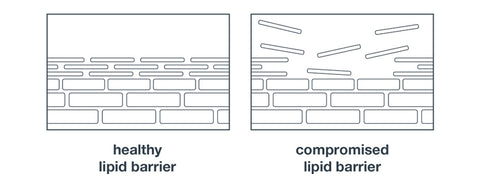Dry skin is more than dehydration. Here’s everything you need to know!
story highlights
- People with dry skin naturally lack a strong lipid barrier, which leads to water loss and dehydration.
- Knowing what causes truly dry skin will give you more than relief – it will allow you to treat dry skin at the source.
why is my skin so dry even when I moisturise?
If you struggle with dry skin, you likely seek out ultra-moisturising products for quick relief. But did you know that while hydration is essential, dry skin needs more than just moisture to stay healthy?
Scientific research shows that healthy skin starts with the right balance of a strong lipid barrier, hydration, and an optimal microbiome (aka microbial environment). If any of these factors are imbalanced, skin can become dry, irritated and prone to damage. People with truly dry (alipoid) skin naturally lack the necessary lipids to maintain a strong, healthy barrier for optimal skin health.
what causes dry skin?
Let’s take a closer look at the lipid barrier, the part it plays in dry skin and how you can help strengthen yours for healthy, hydrated skin.
what is the lipid barrier?
Think of lipids as the “mortar” between your skin’s “bricks”, or corneocytes. This lipid barrier, found in the stratum corneum (your outermost layer of skin), acts as the first line of defence against internal and external factors that can affect skin dryness. A strong lipid barrier helps prevent excess water loss and protects against environmental damage like UV radiation, heat and cold, and other irritants.

what happens when the skin’s lipid barrier is compromised?
When the skin’s lipid barrier is weakened, the first thing that happens is water loss, a.k.a. dehydration. This results in flakiness, dryness, dullness and fine dehydration lines. At this point, skin is more susceptible to environmental damage and signs of premature aging.
what else causes a weak lipid barrier?
Naturally dry skin lacks a strong lipid barrier but there are other contributing factors that can influence barrier performance, that should also be considered:
- Aging depletes skin’s natural lipids over time.
- Seasonal changes like low temperature and low humidity can result in decreased lipids and increased sensitivity.
- Cleansing, over-exfoliating and certain skin care ingredients – including alcohol, acetone, and harsh surfactants – can damage the skin barrier.
- Dietary changes, including reduced fat consumption, can result in lipid deficiency.
- Stress, UV exposure and some diseases can also damage the skin barrier or delay recovery.
how to treat dry skin on face?
For all the complex factors that can influence dry skin and lipid barrier recovery, the solution is relatively simple: focus your skin care regimen around products that nourish your lipid barrier. Look for products that are rich in plant oils and contain ingredients like ceramides, fatty acids (e.g., Palmitic Acid, Stearic Acid, Myristic Acid), and sterols.
- Use a gentle cleanser: avoid harsh cleansers that strip moisture. Choose nourishing formulas like Dermalogica’s Intensive Moisture Cleanser that removes even long-wear make-up while nourishing skin.
- Hydrate deeply: choose moisturisers rich in ceramides, fatty acids and plant oils. Dermalogica's Intensive Moisture Balance nourishes 10 layers deep to restore the skin's lipid barrier.
- Protect against environmental damage: daily sunscreen use is crucial to prevent further moisture loss and damage from UV exposure.
- Avoid over-exfoliation: exfoliating too often can strip essential lipids so use gentle exfoliants designed for dry, sensitive skin.
- Maintain a healthy diet: include foods rich in omega-3 fatty acids and healthy fats to support skin hydration from within.
Dermalogica's Intensive Moisture Balance and Intensive Moisture Cleanser are formulated with a state-of-the-art BioReplenish Complex™, which works on a molecular level to deliver a proven combination of key barrier lipids that help enhance skin’s natural resilience and support barrier recovery.
get expert advice for your dry skin
Need help choosing the right skin care for dry skin? Talk to a professional skin therapist who can do a thorough Face Mapping® skin analysis to help you get your healthiest skin ever, or try virtual Face Mapping® through our AI-driven analysis.
By understanding the causes of dry skin and using the right skincare products, you can achieve hydrated, healthy-looking skin all year round.

